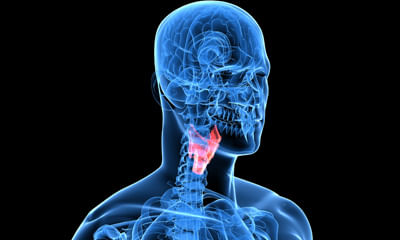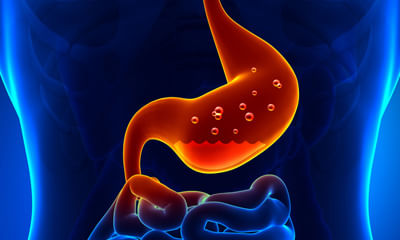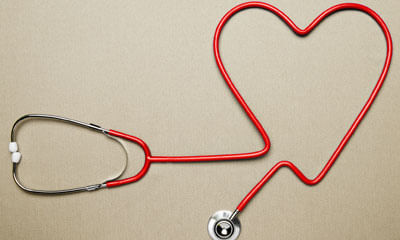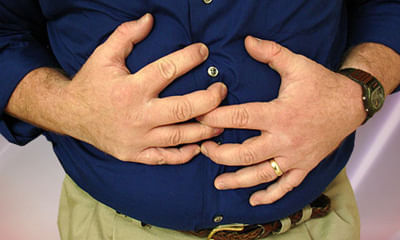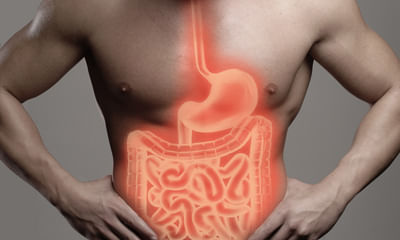Medicine For Celiac Disease
I am 33 years old and I am suffering from gas problem, I am experiencing frequent formation of gas which is released aft ...
Ask Free Question
FLATULENCE (Adhmana) Flatulence or intestinal gas is the state of having excessive stomach and/or intestinal gas (waste gas produced during digestion) that is usually released from the anus with sound and/or odor. CAUSES 1.lactose intolerance, Gluten intolerance. 2.Indigestion All type proteins carbohydrates and fats due to lack of digestive enzymes 3.Gastrosophagial reflux disease Peptic ulcers 4.Helmenthesis and Giardiasis (worm infestation) 5.E.Coli infection 6.Amoebiasis,Yeast infections 7.Gall stones 8.Collitis Intestinal bacterial infections 9.Chron's Disease 10. Mal absorption syndrome DON'TS Examples of foods that can worsen flatulence include: 1.vegetables such as artichokes, broccoli, leeks, cauliflower, cabbage, garlic, onions, beans, Brussels sprouts, and turnips 2.cereals, such as wheat or oats 3.pulses, including beans and lentils 4.dairy products 5.yeast in baked products, such as bread 6.cashews 7.Beans: Complex carbohydrates in beans are difficult for humans to digest. They are digested by microorganisms in the gut known as gut flora, which produce methane. When the complex carbohydrates reach the lower intestine, bacteria feed on them and produce gas. 8.Lactose intolerance: When people consume food that contains lactose, such as milk, and lack the enzymes to break it down, the bacteria feed on the lactose. In some people, this produces large amounts of gas. 9.Celiac disease: Intolerance to the protein gluten means that some people have excessive flatulence when they consume barley, wheat, and rye. 10. Artificial sweeteners: Sorbitol and mannitol are found in candies, chewing-gums, and sugar-free sweet foods. Some people develop diarrhea, gas or both when they consume these substances. 11. Fiber supplements: Adding these too rapidly to the diet can cause flatulence, especially if they contain psyllium. 12. Carbonated drinks: Fizzy drinks and beer may cause a build-up of gas in the intestinal tract. COMPLETE TREATMENT Need to diagnose the exact cause of flatulence Diet Modifications Life Style modification YOGA Improving digestion Drinking plenty of fluids and fruits. YOGA 1.Vajrasan 2.pavanmuktasan I NEED your DETAILED HISTORY INVESTIGATIONS AND PREVIOUS MEDICATIONS DETAILS OF your PROBLEMS. TREATMENT DEPENDS UPON THE UNDERLINED CAUSE. U CAN CONSULT ME FOR THIS PROBLEMS I WISH U HAPPY HEALTHY AND PROSPEROUS LIFE AHEAD GOD BLESS YOU. REGARDS Dr. ARUN DESAI.
I am suffering from hypothyroidism, how can I survive this, what medicine will the best for me. ...
Ask Free Question
Foods to strictly avoid: Goitrogens: foods that block iodine uptake into the thyroid, which is needed to create thyroid hormone. In addition to blocking iodine, goitrogens can block the absorption of thyroid medications. Goitrogens also have the potential to enlarge the thyroid tissue and create a goiter. Green leafy vegetables kale, spinach, cabbage Cruciferous vegetables broccoli, Brussel sprouts, cauliflower, turnips, radish Certain fruits strawberries, peaches, Soy and its derivatives Many of the foods on this list are rich in nutrients so avoiding them completely may not be beneficial. The vegetables in these groups when cooked are much less likely to cause harm because heat inactivates goitrogenic compounds Gluten: many patients with hypothyroidism have a gluten sensitivity or celiac disease. Gluten molecules mimic the antithyroid molecules and thus eating gluten can act as a trigger the attack of the thyroid by the immune system. Gluten can also irritate the lining of the intestines and lead to decreased absorption of thyroid medication and nutrients. Wheat, barley, oats Dairy products: like gluten, dairy molecules can trigger an attack on the thyroid leading to further damage to the tissue. Milk Cheese Yogurt Artificial sweeteners High-fat foods: patients with hypothyroid are at risk for high cholesterol and should limit foods with high saturated fat content Red meat, processed foods, fried food, butter High sugar foods: pastries, candies, desserts, ice cream FOR MEDICATION CONSULT ONLINE IN PRIVATE
My friend age is 48. Thirty five years before he used to ejaculate semen regularly but not doing masturbation. At the in ...
Ask Free Question
You do massage with olive oil and almond oil twice a day. Try some vacuum therapy, kegel exercise and jelqing exercise. Start eating a healthy diet like green vegetables like spinach, cabbage, kale etc contribute in male enhancement. Also citrus fruits like avocado, orange, and lemon that are rich in Vitamin B9. For more suggestion you can consult with us on Lybrate personally.
How to get out from gas trouble by using Ayurveda medicine. I having gas trouble it is not getting any relief since last ...
Ask Free Question
FLATULENCE (Adhmana) Flatulence or intestinal gas is the state of having excessive stomach and/or intestinal gas (waste gas produced during digestion) that is usually released from the anus with sound and/or odor. CAUSES 1.lactose intolerance, Gluten intolerance. 2.Indigestion All type proteins carbohydrates and fats due to lack of digestive enzymes 3.Gastrosophagial reflux disease Peptic ulcers 4.Helmenthesis and Giardiasis (worm infestation) 5.E.Coli infection 6.Amoebiasis,Yeast infections 7.Gall stones 8.Collitis Intestinal bacterial infections 9.Chron's Disease 10. Mal absorption syndrome DON'TS Examples of foods that can worsen flatulence include: 1.vegetables such as artichokes, broccoli, leeks, cauliflower, cabbage, garlic, onions, beans, Brussels sprouts, and turnips 2.cereals, such as wheat or oats 3.pulses, including beans and lentils 4.dairy products 5.yeast in baked products, such as bread 6.cashews 7.Beans: Complex carbohydrates in beans are difficult for humans to digest. They are digested by microorganisms in the gut known as gut flora, which produce methane. When the complex carbohydrates reach the lower intestine, bacteria feed on them and produce gas. 8.Lactose intolerance: When people consume food that contains lactose, such as milk, and lack the enzymes to break it down, the bacteria feed on the lactose. In some people, this produces large amounts of gas. 9.Celiac disease: Intolerance to the protein gluten means that some people have excessive flatulence when they consume barley, wheat, and rye. 10. Artificial sweeteners: Sorbitol and mannitol are found in candies, chewing-gums, and sugar-free sweet foods. Some people develop diarrhea, gas or both when they consume these substances. 11. Fiber supplements: Adding these too rapidly to the diet can cause flatulence, especially if they contain psyllium. 12. Carbonated drinks: Fizzy drinks and beer may cause a build-up of gas in the intestinal tract. COMPLETE TREATMENT Need to diagnose the exact cause of flatulence Diet Modifications To Take More green leafy vegitables fruits dry fruits and salads etc To Avoid Dal chana fast junk foods etc Life Style modification like timelyfood habits good sleep exercises etc Yoga like pavanmuktasan Vajrasan etc. Improving digestion Drinking plenty of fluids and fruits. AYURVEDIC TREATMENT 1.Hingvastak Churna. With luke warm water 2.Lavan bhaskar churna. With luke warm water 3.Avipattikar Churna. With luke warm water. U can consult me on number Nine five three five four two zero seven seven zero. YOGA 1.Vajrasan 2.pavanmuktasan I NEED your DETAILED HISTORY INVESTIGATIONS AND PREVIOUS MEDICATIONS DETAILS OF your PROBLEMS. TREATMENT DEPENDS UPON THE UNDERLINED CAUSE. U CAN CONSULT ME FOR THIS PROBLEMS I WISH U HAPPY HEALTHY AND PROSPEROUS LIFE AHEAD GOD BLESS YOU.
My father is of 70 years age and he is a diabetic n heart patient he has undergone a angioplasty in October 2017 after t ...
Ask Free Question
Take small frequent bland meal. Eat slowly and chew well. Lot of salad before each.
Mujhe celiac disease hai jiski wajah se mjhe anemia hai or me koi bhi iron Ka syrup ya tablet khoon bharaney k liye leti ...
Ask Free Question
In celiac disease it is important that you avoid gluten containing diet. If you are intolerant to oral iron formulations even after changing the drug composition and schedule, then you need to be given parenteral iron formulation. Get in touch with a Hematologist. In case you want to consult online, I will be happy to help.
Total RBC-6.21,Hemoglobin 12.4 ,MCV -68.4 ,MCH -20 ,MCHC -29.2, RDW-CV 18.6 and Thyroid stimulating hormone (TSH)-7.39 s ...
Ask Free Question
You have mild iron deficiency anemia Anaemia occurs when you have a decreased level of hemoglobin in your red blood cells (RBCs). Hemoglobin is the protein in your RBCs that is responsible for carrying oxygen to your tissues. Iron deficiency anemia is the most common type of anemia, and it occurs when your body doesn’t have enough of the mineral iron. Your body needs iron to make hemoglobin. When there isn’t enough iron in your blood stream, the rest of your body can’t get the amount of oxygen it needs. While the condition may be common, many people don’t know they have iron deficiency anaemia. It’s possible to experience the symptoms for years without ever knowing the cause. In women of childbearing age, the most common cause of iron deficiency anaemia is a loss of iron in the blood due to heavy menstruation or pregnancy. A poor diet or certain intestinal diseases that affect how the body absorbs iron can also cause iron deficiency anaemia Iron Deficiency Anemia Symptoms Causes Risk factors Diagnosis Anemia in women Complications Treatment Prevention Outlook What is iron deficiency anemia? Anemia occurs when you have a decreased level of hemoglobin in your red blood cells (RBCs). Hemoglobin is the protein in your RBCs that is responsible for carrying oxygen to your tissues. Iron deficiency anemia is the most common type of anemia, and it occurs when your body doesn’t have enough of the mineral iron. Your body needs iron to make hemoglobin. When there isn’t enough iron in your blood stream, the rest of your body can’t get the amount of oxygen it needs. While the condition may be common, many people don’t know they have iron deficiency anemia. It’s possible to experience the symptoms for years without ever knowing the cause. In women of childbearing age, the most common cause of iron deficiency anemia is a loss of iron in the blood due to heavy menstruation or pregnancy. A poor diet or certain intestinal diseases that affect how the body absorbs iron can also cause iron deficiency anemia. Doctors normally treat the condition with iron supplements or changes to diet. SYMPTOMS Symptoms of iron deficiency anemia The symptoms of iron deficiency anemia can be mild at first, and you may not even notice them. According to the American Society of Hematology (ASH), most people don’t realize they have mild anemia until they have a routine blood test. The symptoms of moderate to severe iron deficiency anemia include: general fatigue weakness pale skin shortness of breath dizziness strange cravings to eat items that aren’t food, such as dirt, ice, or clay a tingling or crawling feeling in the legs tongue swelling or soreness cold hands and feet fast or irregular heartbeat brittle nails headaches CAUSES Causes of iron deficiency anemia According to the ASH, iron deficiency is the most common cause of anemia. There are many reasons why a person might become deficient in iron. These include: Inadequate iron intake Eating too little iron over an extended amount of time can cause a shortage in your body. Foods such as meat, eggs, and some green leafy vegetables are high in iron. Because iron is essential during times of rapid growth and development, pregnant women and young children may need even more iron-rich foods in their diet. Pregnancy or blood loss due to menstruation Heavy menstrual bleeding and blood loss during childbirth are the most common causes of iron deficiency anemia in women of childbearing age. Internal bleeding Certain medical conditions can cause internal bleeding, which can lead to iron deficiency anemia. Examples include an ulcer in your stomach, polyps in the colon or intestines, or colon cancer. Regular use of pain relievers, such as aspirin, can also cause bleeding in the stomach. Read more: Learn about cytopenia and anemia's relationship » Inability to absorb iron Certain disorders or surgeries that affect the intestines can also interfere with how your body absorbs iron. Even if you get enough iron in your diet, celiac disease or intestinal surgery such as gastric bypass may limit the amount of iron your body can absorb. RISK FACTORS Risk factors Anemia is a common condition and can occur in both men and women of any age and from any ethnic group. Some people may be at greater risk of iron deficiency anemia than others, including: women of childbearing age pregnant women people with poor diets people who donate blood frequently infants and children, especially those born prematurely or experiencing a growth spurt vegetarians who don’t replace meat with another iron-rich food If you’re at risk of iron deficiency anemia, talk to your doctor to determine if blood testing or dietary changes could benefit you. DIAGNOSIS How it’s diagnosed A doctor can diagnose anemia with blood tests. These include: Complete blood cell (CBC) test A complete blood count (CBC) is usually the first test a doctor will use. A CBC measures the amount of all components in the blood, including: red blood cells (RBCs) white blood cells (WBCs) hemoglobin hematocrit platelets The CBC provides information about your blood that is helpful in diagnosing iron deficiency anemia. This information includes: the hematocrit level, which is the percent of blood volume that is made up of RBCs the hemoglobin level the size of your RBCs A normal hematocrit range is 34.9 to 44.5 percent for adult women and 38.8 to 50 percent for adult men. The normal hemoglobin range is 12.0 to 15.5 grams per deciliter for an adult woman and 13.5 to 17.5 grams per deciliter for an adult man. In iron deficiency anemia, the hematocrit and hemoglobin levels are low. Also, RBCs are usually smaller in size than normal. A CBC test is often performed as part of a routine physical examination. It’s a good indicator of a person’s overall health. It may also be performed routinely before a surgery. This test is useful to diagnose this type of anemia because most people who have an iron deficiency don’t realize it. Other tests Anemia can usually be confirmed with a CBC test. Your doctor might order additional blood tests to determine how severe your anemia is and help determine treatments. They may also examine your blood through a microscope. These blood tests will provide information, including: the iron level in your blood your RBC size and color (RBCs are pale if they’re deficient in iron) your ferritin levels your total iron-binding capacity (TIBC) Ferritin is a protein that helps with iron storage in your body. Low levels of ferritin indicate low iron storage. A TIBC test is used to determine the amount transferrin that’s carrying iron. Transferrin is a protein that transports iron. Tests for internal bleeding If your doctor is concerned that internal bleeding is causing your anemia, additional tests may be needed. One test you may have is fecal occult test to look for blood in your feces. Blood in your feces may indicate bleeding in your intestine. Your doctor may also perform an endoscopy, in which they use a small camera on a flexible tube to view the linings of your gastrointestinal tract. An EGD test, or upper endoscopy, allows a doctor to examine the lining of the esophagus, stomach, and the upper part of the small intestine. A colonoscopy, or lower endoscopy, allows a doctor to examine the lining of the colon, which is the lower portion of the large intestine. These tests can help identify sources of gastrointestinal bleeding. ANEMIA IN WOMEN Iron deficiency anemia in women Pregnancy, significant menstrual bleeding, and uterine fibroids are all reasons why women are more likely to experience iron deficiency anemia. Heavy menstrual bleeding occurs when a woman bleeds more or longer than women typically bleed during menstruation. According to the Centers for Disease Control and Prevention, typical menstrual bleeding lasts for 4 to 5 days and the amount of blood lost ranges from 2 to 3 tablespoons. Women with excess menstrual bleeding typically bleed for more than seven days and lose twice as much blood as normal. According to the National Heart, Lung, and Blood Institute, an estimated 20 percent of women of childbearing age have iron deficiency anemia. Pregnant women are even more likely to have iron deficiency anemia because they require greater amounts of blood to support their growing babies. A pelvic ultrasound can help a doctor look for the source of excess bleeding during a woman’s period, such as fibroids. Like iron deficiency anemia, uterine fibroids often don’t cause symptoms. They occur when muscular tumors grow in the uterus. While they’re not usually cancerous, they can cause heavy menstrual bleeding that can lead to iron deficiency anemia. COMPLICATIONS Health complications of iron deficiency anemia Most cases of iron deficiency anemia are mild and don’t cause complications. The condition can usually be corrected easily. However, if anemia or iron deficiency is left untreated, it can lead to other health problems. These include: Rapid or irregular heartbeat When you’re anemic, your heart has to pump more blood to make up for the low amount of oxygen. This can lead to irregular heartbeat. In severe cases, it can lead to heart failure or an enlarged heart. Pregnancy complications In severe cases of iron deficiency, a child may be born prematurely or with a low birth weight. Most pregnant women take iron supplements as part of their prenatal care to prevent this from happening. Delayed growth in infants and children Infants and children who are severely deficient in iron may experience delayed growth and development. They may also be more prone to infections. TREATMENT Treatment options Iron supplements Iron tablets can help restore iron levels in your body. If possible, you should take iron tablets on an empty stomach, which helps the body absorb them better. If they upset your stomach, you can take them with meals. You may need to take the supplements for several months. Iron supplements may cause constipation or black stools. Diet Diets that include the following foods can help treat or prevent iron deficiency: red meat dark green, leafy vegetables dried fruits nuts iron-fortified cereals Additionally, vitamin C helps your body absorb iron. If you’re taking iron tablets, a doctor might suggest taking the tablets along with a source of vitamin C, such as a glass of orange juice or citrus fruiYour TSH is mildly elevated you may repeat the test after 3 months. You don't require any medicines right now.
Stomach pain hardly after eating the lunch and gas problem also create. Please suggest any medicine. ...
Ask Free Question
There r so many reasons for stomach pain after eating (like food intolerance/food allergy/peptic ulcer disease/irritable bowel syndrome/ celiac disease/gall stones/prolong constipation/obstruction etc. Are serious of them). So internal pathology should be detected first, then treatment start. Homeopathic medicine always do well in these cases, which causes no side effects.
I am suffering from loose muddy stools and pain in lower right abdomen. What could it be. Every test came normal. No cel ...
Ask Free Question
Take Tab: Aampachak Vati 2----------2 Tab: Kutaj Parpati vati 2-----------2 Syrup: Kutajarishta 2tablespoon 2 times.
Suffering from IBS problem since last more than 12 years. Consult many doctors and they did many tests like endoscopy, c ...
Ask Free Question
Hi First of all I will advise you not to take stress as stress aggravates irritable bowel syndrome. It happens when our large intestine colon gets hypersensitive and overreacts to mild stimulation. First of all tell me do you feel pain too and exactly where and are stools hard or weak and secondly are you taking any other medications for anything else too. Now for gas and constipation do as follows:- Take Tab Pantocid 40 mg Od Half hour before breakfast Syp Looz 3tsf BD And do some diet and lifestyle modifications like   CHECK YOUR SYMPTOMS FIND A DOCTOR FIND LOWEST DRUG PRICES HEALTH A-Z DRUGS & SUPPLEMENTS LIVING HEALTHY FAMILY & PREGNANCY NEWS & EXPERTS MOBILE APPS SUBSCRIPTIONS SUBSCRIBE SUBSCRIBE Irritable Bowel Syndrome Guide Irritable Bowel Syndrome IBS affects between 25 and 45 million Americans. Most of them are women. People are most likely to get the condition in their late teens to early 40s. IBS is a mix of belly discomfort or pain and trouble with bowel habits: either going more or less often than normal (diarrhea or constipation) or having a different kind of stool (thin, hard, or soft and liquid). It’s not life-threatening, and it doesn't make you more likely to get other colon conditions, such as ulcerative colitis, Crohn's disease, or colon cancer. But IBS can be a long-lasting problem that changes how you live your life. People with IBS may miss work or school more often, and they may feel less able to take part in daily activities. Some people may need to change their work setting: shifting to working at home, changing hours, or even not working at all. What Are the Symptoms of IBS? People with IBS have symptoms that can include: Diarrhea (often described as violent episodes of diarrhea) Constipation Constipation alternating with diarrhea Belly pains or cramps, usually in the lower half of the belly, that get worse after meals and feel better after a bowel movement A lot of gas or bloating Harder or looser stools than normal (pellets or flat ribbon stools) A belly that sticks out CONTINUE READING BELOW Stress can make symptoms worse. Some people also have urinary symptoms or sexual problems. There are four types of the condition. There is IBS with constipation (IBS-C) and IBS with diarrhea (IBS-D). Some people have an alternating pattern of constipation and diarrhea. This is called mixed IBS (IBS-M). Other people don’t fit into these categories easily, called unsubtyped IBS, or IBS-U. What Are the Causes? While there are several things known to trigger IBS symptoms, experts don't know what causes the condition. Studies suggest that the colon gets hypersensitive, overreacting to mild stimulation. Instead of slow, rhythmic muscle movements, the bowel muscles spasm. That can cause diarrhea or constipation. Some think that IBS happens when the muscles in the bowels don't squeeze normally, which affects the movement of stool. But studies don’t seem to back this up. Another theory suggests it may involve chemicals made by the body, such as serotonin and gastrin, that control nerve signals between the brain and digestive tract. CONTINUE READING BELOW Other researchers are studying to see if certain bacteria in the bowels can lead to the condition Because IBS happens in women much more often than in men, some believe hormones may play a role. So far, studies haven’t borne this out. How Is It Diagnosed? There are no specific lab tests that can diagnose IBS. Your doctor will see if your symptoms match with the definition of IBS, and he may run tests to rule out conditions such as: Food allergies or intolerances, such as lactose intolerance and poor dietary habits Medications such as high blood pressure drugs, iron, and certain antacids Infection Enzyme deficiencies where the pancreas isn't releasing enough enzymes to properly digest or break down food Inflammatory bowel diseases like ulcerative colitis or Crohn's disease Your doctor may do some of the following tests to decide if you have IBS: Flexible sigmoidoscopy or colonoscopy to look for signs of blockage or inflammation in your intestines Upper endoscopy if you have heartburn or indigestion X-rays Blood tests to look for anemia (too few red blood cells), thyroid problems, and signs of infection Stool tests for blood or infections Tests for lactose intolerance, gluten allergy, or celiac disease Tests to look for problems with your bowel muscles CONTINUE READING BELOW How Is IBS Treated? Nearly all people with IBS can get help, but no single treatment works for everyone. You and your doctor will need to work together to find the right treatment plan to manage your symptoms. Many things can trigger IBS symptoms, including certain foods, medicines, the presence of gas or stool, and emotional stress. You’ll need to learn what your triggers are. You may need to make some lifestyle changes and take medication. Diet and Lifestyle Changes Usually, with a few basic changes in diet and activities, IBS will improve over time. Here are some tips to help reduce symptoms: Avoid caffeine (in coffee, teas, and sodas). Add more fiber with foods like fruits, vegetables, whole grains, and nuts. Drink at least three to four glasses of water per day. Don't smoke. Learn to relax, either by getting more exercise Limit how much milk or cheese you eat. Eat smaller meals more often instead of big meals.


